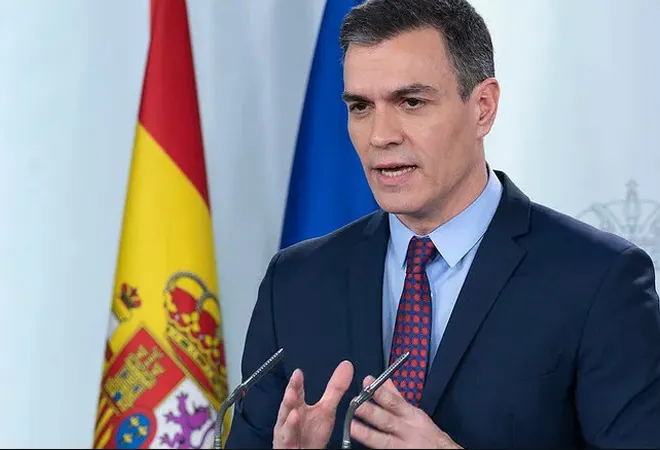-
CENTRES
Progammes & Centres
Location
Even though Spanish politicians are pacifying fears that the national elections would not affect its EU presidency, a change of guard would most likely affect momentum

The ‘Spanish semester’ is here. On 1 July, Spain assumed the presidency of the Council of the European Union (EU) for the fifth time. This means that until the end of the year, Spain will lead all the debates within the Union, set the agenda, drive negotiations, and also try and factor its own interests into the European agenda.
The last time Spain held the Presidency of the Council of the EU was in 2010, shortly after the introduction of the Lisbon Treaty's institutional reforms. Thirteen years later, the Spanish presidency comes during a period of intense political activity at the national level, but also at a critical juncture in international affairs: a prolonged war in Ukraine, high inflation levels, the weaponisation of trade links, and heightened great power dynamics.
Spain has identified a number of priority areas for its presidency.
The last time Spain held the Presidency of the Council of the EU was in 2010, shortly after the introduction of the Lisbon Treaty's institutional reforms.
A top priority is the EU’s re-industrialisation and the strengthening of its 'open strategic autonomy'. This concept seeks to reduce lopsided dependencies that were on full display during the COVID-19 pandemic and Russia-Ukraine conflict, secure supply chains, develop strategic industries and technologies within Europe, and attract new companies to the continent. This change in approach at the EU level—to find a balance between the risks and opportunities of economic interdependence while avoiding protectionism—will encompass the areas of food, health, security, energy and technology, as further evidenced by the recently published European Economic Strategy. Spain has shown readiness to lead the debate on the EU’s open strategic autonomy, as evidenced by the joint proposal with the Netherlands in 2021.
As part of this approach, the EU is also in the process of expanding its commercial relations with strategic partners worldwide and reducing dependencies on China. In this context, Spain will direct special efforts towards Latin America, a key area of its own foreign policy. The EU-CELAC (Community of Latin American and Caribbean States) upcoming Summit in mid-July gains particular prominence, where the elephant in the room will be the EU-Mercosur trade deal that has been in limbo for two decades, not least due to environmental concerns. Besides Mercosur, trade agreements with Mexico and Chile also await ratification. Spain’s traditional status as a bridge between the EU and Latin America could help push the needle on these deals. Closer ties with Latin America will also come in handy as Europe attempts to recalibrate its relations with other countries in the Global South.
Spain also aims to advance the green transition, with a particular emphasis on electricity market reform, given the rise in energy prices spurred by the conflict in Ukraine. Spain is well-positioned to lead this transition given its domestic successes in the realm of renewable energies. Spanish Prime Minister Pedro Sanchez claims the transition will save Europe €133 billion in fossil fuel imports by 2030 and create a million jobs.
Spain’s traditional status as a bridge between the EU and Latin America could help push the needle on these deals.
Another priority is the sealing of the EU’s new Migration and Asylum Pact that was proposed in 2020. Since 2015, migration has been amongst the most electric of issues in the EU, assuming greater urgency with each passing year and multiple tragedies of sinking boats and migrant deaths. Only recently, EU ministers agreed on a plan to share the responsibility for migrants entering Europe.
The EU is also one of its kind globally to regulate artificial intelligence (AI) through its proposed AI Act, which is even more relevant in the wake of newly emerged technologies such as ChatGPT. Spain will hope to get this legislation passed during its presidency.
A number of other issues will also dominate the agenda, including the promotion of greater social and economic justice through an elimination of tax evasion by both people and corporations, which costs the EU 1.5 percent of its GDP. Another contentious subject is the review of the Multi-annual Financial Framework for 2021-2027, in other words, the European budget, which needs topping up after the heavy cost of supporting Ukraine. In addition, reforming the bloc’s fiscal rules as well as deepening the internal market through a banking union and capital markets union will also be under focus. Finally, Spain will reinforce European unity, with continued support for Ukraine against Russia. Spain has surprisingly emerged as a strong supporter of Ukraine, pledging to send 10 Leopard tanks to Kyiv in its fight against Russia.
Ordinarily, the presidency would have been Spain’s moment under the sun—a grand opportunity for the EU’s fourth-largest economy to boost its international credibility and stature. With all these areas under focus, it is clear that there is no dearth of ambition.
Spain has traditionally punched below its weight in the area of foreign policy due to challenges at home including economic woes, political disturbances, and the Catalan separatist movement.
However, there is one large caveat. Spain goes to the polls in a snap election on 23 July called by the incumbent Sanchez, whose ruling coalition suffered losses in recent regional and municipal elections.
Spain’s presidency has arrived at a critical moment—it will be the last complete presidency before European Parliament elections in June 2024 and a new European Commission takes the reins, and the last chance to finalise pending files and pieces of legislation. The following presidency will be Belgium’s during which the EU would be in campaign mode, distracted from the many dossiers needing attention. The last in the 18-month trio of presidencies will be the anti-EU Hungary, who will take over in the second half of 2024.
Even though Spanish politicians have been busy pacifying fears that the elections would dent the presidency and its goals, it is difficult to imagine that a change of guard in the midst of the six-month presidency would not affect momentum. The Spaniards have pointed out France’s two rounds of presidential elections during its presidency in the first half of 2021. At the very least though, elections will distract and likely slow down the EU agenda. These fears are further compounded by the possibility of a right-wing coalition government with an alliance between the conservative Partido Popular party and the far-right Vox. However, it is assuring that Spain is amongst the most pro-EU countries, with no political party pandering to Euroscepticism.
Another factor to take into account is the Lisbon Treaty signed in 2007 that made significant changes to the rotating Presidency of the Council, thereby diminishing the power and influence of the holder country. Thus, the impact of Spain’s national elections would likely be minor since the Presidency of the Council is a largely technical role and is determined by the continuity that is ensured through the trio system. This system requires each Presidency to build on the work of the previous presidency, making sure that efforts remain consistent across 18 months.
Sanchez has tried catapulting Spain’s role at the EU and global level by taking advantage of the country’s relatively stable economy as well as openings provided by Italy’s eurosceptic ruling coalition and Brexit.
Spain has traditionally punched below its weight in the area of foreign policy due to challenges at home including economic woes, political disturbances, and the Catalan separatist movement. In recent years, Sanchez has tried catapulting Spain’s role at the EU and global level by taking advantage of the country’s relatively stable economy as well as openings provided by Italy’s eurosceptic ruling coalition and Brexit. In addition, Sanchez has maintained close ties with Germany and France, both power brokers in the EU. Yet with domestic political challenges, it remains to be seen whether Spain will live up to the expectations of its presidency.
Achieving consensus between 27 EU member states is hard enough. It could be an even more cumbersome task under a potentially distracted presidency with Madrid, rather than Brussels, under greater focus.
Patrizia Cogo Morales is Project Manager and Research Assistant at the Elcano Royal Institute’s Office in Brussels.
Shairee Malhotra is Associate Fellow with the Strategic Studies Programme at the Observer Research Foundation.
The views expressed above belong to the author(s). ORF research and analyses now available on Telegram! Click here to access our curated content — blogs, longforms and interviews.

Shairee Malhotra is Associate Fellow, Europe with ORF’s Strategic Studies Programme. Her areas of work include Indian foreign policy with a focus on EU-India relations, ...
Read More +
Trisha Ray is an associate director and resident fellow at the Atlantic Council’s GeoTech Center. Her research interests lie in geopolitical and security trends in ...
Read More +